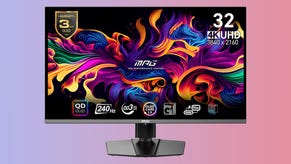Nvidia GeForce RTX 4070 review: an RTX 3080 challenger for $599
A solid 1440p upgrade - but Cyberpunk 2077 RT Overdrive hints at something more.
Our rasterisation benchmarks come to a conclusion on this final page of tests. In terms of the titles we've got lined up for you, we have a quartet of very different games and engines on display. Hitman 3's Glacier engine is super-performant without RT enabled, while the remaining trio of games are all-new. Marvel's Spider-Man: Miles Morales makes its debut, along with two titles designed with the latest generation of gaming hardware in mind: Asobo's graphically stunning A Plague Tale: Requiem and Sony's impressive port of Returnal.
Once again, if you're jumping straight to this page without looking at prior results, we should stress that our benchmarking system offers a number of ways to get to the data you want, the presentation varying according to the device you're using. You'll get a basic overview of our findings on mobile, with metadata from the video capture of each GPU being translated into simple bar charts with average frame-rate and lowest one per cent measurements for easy comparisons.
On a desktop-class browser, you'll get the full-fat DF experience with embedded YouTube videos of each test scene and live performance metrics. Play the video, and you'll see exactly how each card handled the scene as it progresses. Below the real-time metrics is an interactive bar chart, which you can mouse over to see different measurements and click to switch between actual frame-rates and percentage differences. All the data here is derived from video captured directly from each GPU, ensuring an accurate replay of real performance.
Hitman 3
Bearing in mind that Hitman 3 can hit a fairly consistent 60 frames per second on the Xbox Series X - which is, in turn, broadly comparable to RTX 2070 Super - it's no surprise to see that the latest generation of GPUs blitz this game, even maxed out. The Super itself averages at 99fps in the Dubai benchmark.
Here, the RTX 3080 still manages to carve out a small lead against the RTX 4070 - it's around four percent faster at 1440p. However, it's largely academic here as the practical reality of this comparison is that average frame-time on the RTX 3080 rises by just 0.2ms. The higher frame-rates get, the less relevant they become really.
Still, this result effectively places the RTX 4070 on par with the RX 6800 XT, and you're around 28 percent on average ahead of the RTX 3070. Looking back at RTX 20-series cards in the same series, the improvement to performance speaks for itself: almost a 2.1x performance increase up against RTX 2070, dropping back a touch to a 78 percent boost up against the Super variant.
Hitman, Ultra, TAA
Marvel's Spider-Man: Miles Morales
Marvel's Spider-Man: Miles Morales threw up one of the biggest surprises of our 4070 testing with RT enabled, delivering a substantial boost to performance against the RTX 3080. However, with the RT bells and whistles removed, we're faced with something a touch unexpected: performance returns to more of a baseline level. The RTX 4070 is capable, but not quite as potent as RTX 4080, with the Ampere card around 3.5 percentage points ahead at 1440p. It's hardly game-changing when frame-rates are so high (literally fractions of a millisecond in render time) but it does bring the card more closely into line with existing results. The boost versus RTX 3070 is impressive though, with a 43 percentage point gain.
The RTX 4070 at 1440p resolution pulls ahead of the RX 6800 XT by around 12 percent, while it's a return to form for the comparisons up against the 20-series Turing cards with a circa-2.2x performance increase over the RTX 2070, dropping to 'just' a straight doubling of frame-rates against the RTX 2070 Super. The comparisons against 2070 Super are certainly even more interesting bearing in mind how close that product tends to perform against the PlayStation 5 and Xbox Series X.
Marvel's Spider-Man: Miles Morales, Max Settings
A Plague Tale: Requiem
We've flirted with Asobo Studio's stunning new game with sporadic benchmarks in prior GPU reviews, but as we're completely rebenching from scratch now, we're now including it in all testing - and the results are fascinating. The RTX 4070 is essentially on level ground with the RTX 3080 here, and around seven points to the better against the RX 6800 XT. It's interesting to note that both 4070 and 3080 here only command a 25 percentage point lead over the RTX 3070.
We're looking at a 72 percentage point increase over the RTX 2070 Super, rising to an almost 2x increase in performance over the older, non-Super version (it's around 93 percent faster). It's worth pointing out that there is a small drop-off in performance at 4K resolution, where the 3080 can move ahead a touch, but overall frame-rates are low enough that you'd be using DLSS and/or frame generation on this one.
A Plague Tale Requiem, Ultra Settings
Returnal
Finally, we're adding Returnal to our mix of rasterised titles as it's game genuinely targeting current generation hardware. There are no last-gen ports of this one, and even on PS5, it's running internally at 1080p resolution on a mixture of high and epic settings. The benchmark on the PC is lengthy, comprehensive, stutter-free and splits into seven sectors, each targeting specific graphical features. Overall it's probably more demanding than the game itself, so a good result here should indicate great playability.
Here, at native 1440p, once again we see the RTX 3080 deliver a small lead, but at four percent, it's hardly game-changing. The RX 6800 XT is in the think of it, inching slightly ahead of the 3080. All three cards are clearly delivering performance in the same class, though the 3070 holds up fairly well overall, with around 81 percent of the 4070's performance. Frame-rates dip beneath 60fps at full 4K, and the 3080 delivers a palpably faster level of performance - but I'd still be opting for a DLSS option for a 4K output.
Looking at prior generation cards, the upgrade is still there, but not as large as it is elsewhere in our figures: the 4070 comes in with an 81 percentage point lead up against the 2070, dropping to around 16 percent against the Super.
Returnal, Epic Settings
Nvidia GeForce RTX 4070 analysis
- Introduction, hardware and power analysis
- RT benchmarks: Dying Light 2, Cyberpunk 2077, Control, F1 22
- RT benchmarks: Hitman 3, Metro Exodus Enhanced Edition, Marvel's Spider-Man: Miles Morales
- RT/DLSS/FSR2/DLSS3 benchmarks: Cyberpunk 2077, Dying Light 2, Forza Horizon 5, Marvel's Spider-Man: Miles Morales
- Game benchmarks: Control, Cyberpunk 2077, F1 22, Forza Horizon 5
- Game benchmarks: Hitman 3, Marvel's Spider-Man: Miles Morales, A Plague Tale: Requiem, Returnal [This Page]
- Nvidia GeForce RTX 4070: the Digital Foundry verdict








